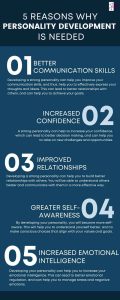Personality development is a crucial aspect of our lives that helps us to become the best version of ourselves. It involves working on our self-awareness, setting goals, building confidence, developing positive habits, and building strong relationships. By focusing on these areas, we can improve our communication skills, build stronger relationships, and increase our overall sense of well-being. In this article, we will discuss each of these steps in more detail and provide strategies for achieving them.
5 Reasons Why Personality Development is Needed
- Better Communication Skills: Developing a strong personality can help you improve your communication skills, and thus, help you to effectively express your thoughts and ideas. This can lead to better relationships with others and can help you to achieve your goals.
- Increased Confidence: A strong personality can help to increase your confidence, which can lead to better decision-making, and can help you to take on new challenges and opportunities.
- Improved Relationships: Developing a strong personality can help you to build better relationships with others. You will be able to understand others better and communicate with them in a more effective way.
- Greater Self-Awareness: By developing your personality, you will become more self-aware. This will help you to understand yourself better, and to make conscious choices that align with your values and goals.
- Increased Emotional Intelligence: Developing your personality can help you to increase your emotional intelligence. This can lead to better emotional regulation and can help you to manage stress and negative emotions.

Also Read:
10 Unique Ways to Develop a Strong Personality
Having a strong personality is important for success in both personal and professional life. A strong personality can help you build better relationships, improve your confidence and communication skills, and achieve your goals. However, developing a strong personality is not always easy, and it requires time and effort. Here are 10 unique ways to develop a strong personality:
Embrace Failure
One of the keys to developing a strong personality is learning to embrace failure. Failure is a natural part of life, and it’s essential for growth and development. Instead of fearing failure, learn to view it as an opportunity to learn and grow. The more you’re willing to take risks and fail, the more you’ll develop the resilience and determination needed to achieve your goals.
Practice Active Listening
Active listening is an essential skill for developing a strong personality. It involves paying attention to what the other person is saying and responding in an appropriate and respectful manner. By practicing active listening, you can improve your communication skills and build better relationships with others.
Set Goals and Take Action
Setting goals and taking action is another important aspect of developing a strong personality. It’s essential to have a clear sense of direction and to work towards achieving your goals. By setting realistic and achievable goals, and taking action to achieve them, you can develop the discipline and focus needed to achieve success.
Cultivate a Positive Attitude
A positive attitude is essential for developing a strong personality. It can help you to overcome challenges, build better relationships, and achieve your goals. Cultivate a positive attitude by focusing on the good in life, and by practicing gratitude and optimism.
Take Responsibility
Taking responsibility is an important aspect of developing a strong personality. It involves being accountable for your own actions and decisions, and not blaming others for your problems. By taking responsibility, you can develop the self-awareness and self-esteem needed to make positive changes in your life.
Learn from your mistakes
Learning from your mistakes is an essential part of developing a strong personality. Mistakes are a natural part of life, and they can provide valuable insights into our own strengths and weaknesses. By learning from your mistakes, you can avoid repeating them, and develop the wisdom and maturity needed to achieve your goals.
Be Confident
Confidence is key to developing a strong personality. It’s essential to believe in yourself and your abilities and to approach challenges with a positive attitude. By building confidence, you can develop the self-esteem and resilience needed to achieve your goals.
Be Flexible
Flexibility is an important aspect of developing a strong personality. It’s essential to be able to adapt to changing circumstances and to be open to new experiences and ideas. By being flexible, you can develop the creativity and adaptability needed to achieve success.
Be resilient
Resilience is an important aspect of developing a strong personality. It’s essential to be able to bounce back from setbacks and challenges and to persevere in the face of adversity. By developing resilience, you can build the mental toughness and determination needed to achieve your goals.
Keep Learning
Learning is an ongoing process, and it’s essential for developing a strong personality. By constantly expanding your knowledge and skills, you can develop the intelligence and creativity needed to succeed. Keep learning by reading, taking courses, and seeking out new experiences.
What factors affect personality?
- Genetics: Research suggests that genetics play a significant role in shaping one’s personality. Studies have shown that certain personality traits, such as introversion and extroversion, are largely inherited.
- Childhood experiences: Childhood experiences, such as the way a person is raised, can have a significant impact on personality development. For example, a child who is raised in a nurturing and supportive environment is more likely to develop a healthy sense of self-esteem and self-worth.
- Social and cultural influences: Social and cultural influences, such as religion, culture, and community, can shape one’s personality by providing guidance on values and beliefs, and can also shape behavior, communication and lifestyle.
- Life experiences: Life experiences, such as education, work, and relationships, can shape personality by providing opportunities for personal growth and learning. They can help a person to develop new skills and perspectives, and can also shape one’s values and beliefs.
- Trauma: Traumatic experiences can have a significant impact on personality development, particularly if they occur during childhood. Trauma can lead to the development of negative personality traits, such as anxiety and depression, and can also affect a person’s ability to form healthy relationships.
- Neural processes and brain function: Research suggests that certain areas of the brain and neural processes play a role in shaping personalities, such as neurotransmitters and hormones.
It’s important to note that personality is a complex and multi-faceted concept, and these factors may interact in complex ways. These factors can also change and develop over time, and personality can be shaped by the interaction of many different influences.
In conclusion, developing a strong personality is a lifelong journey that involves self-awareness, setting goals, and making conscious efforts to improve oneself. By implementing these strategies, you can gain a better understanding of yourself, identify areas that need improvement, and set goals for personal development. Remember that personality development is a continuous process and requires patience, consistency and the willingness to learn and grow. It’s important to keep in mind that everyone is unique and there is no one-size-fits-all formula for personality development. But by following these unique ways, you will be able to achieve the desired results and become the best version of yourself.
FAQ
What are the 5 areas of personal development?
- Self-awareness: This area of personal development is all about understanding oneself, including one’s strengths, weaknesses, values, and emotions. It’s about gaining a deeper understanding of who you are, and what drives you.
- Professional development: This area of personal development is all about developing the skills and knowledge necessary to excel in your chosen field. It may include things like taking classes, attending conferences and networking with others in your industry.
- Physical development: This area of personal development is all about taking care of your physical health and well-being. It includes things like exercise, healthy eating, and getting enough sleep.
- Emotional development: This area of personal development is all about understanding and managing your emotions. It includes things like learning to identify and express your feelings and developing healthy coping mechanisms for dealing with stress and negative emotions.
- Social development: This area of personal development is all about building healthy relationships and connecting with others. It includes things like developing communication skills, learning to empathize with others, and building a supportive network of friends and family.
How can I improve my personality and attitude?
To improve your personality and attitude, practice self-reflection, be open-minded, positive, self-aware, take responsibility, communicate effectively, have confidence, be resilient, keep learning, and practice self-discipline. These steps will help you to gain a better understanding of yourself, identify areas that need improvement, and set goals for personal development. Additionally, focus on building healthy relationships, and be open to new ideas, perspectives and experiences.
How can I improve myself every day?
To improve yourself every day, set daily goals, practice self-reflection, engage in continuous learning, practice self-discipline, maintain a positive attitude, practice gratitude, engage in physical exercise, maintain a healthy diet, meditate or practice mindfulness, and surround yourself with positive influences. Additionally, make time for self-care and prioritize self-improvement. Remember that self-improvement is a lifelong journey, and it’s important to be patient and consistent in your efforts.
What is personality development?
Personality development is the process of improving and enhancing one’s personality traits, behaviors, attitudes, and skills. It is a lifelong process that involves gaining self-awareness, understanding one’s strengths and weaknesses, setting personal goals, and making conscious effort to improve oneself. The goal of personality development is to become a well-rounded, confident, and successful individual who can effectively communicate and interact with others, and can adapt and respond to different situations. It includes developing emotional intelligence, building positive relationships, developing professional skills and achieving personal goals.




